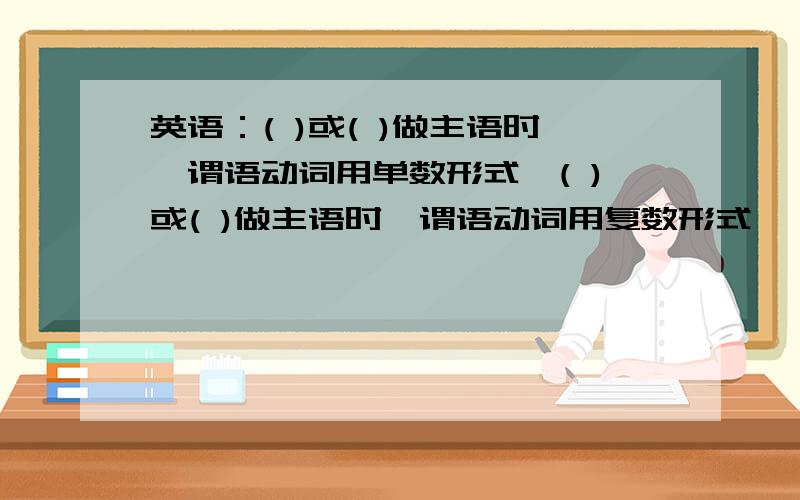иӢұиҜӯпјҡ( )жҲ–( )еҒҡдё»иҜӯж—¶,и°“иҜӯеҠЁиҜҚз”ЁеҚ•ж•°еҪўејҸ,( )жҲ–( )еҒҡдё»иҜӯж—¶,и°“иҜӯеҠЁиҜҚз”ЁеӨҚж•°еҪўејҸ
жқҘжәҗпјҡеӯҰз”ҹдҪңдёҡеё®еҠ©зҪ‘ зј–иҫ‘пјҡдҪңдёҡеё® ж—¶й—ҙпјҡ2024/11/19 21:35:39

иӢұиҜӯпјҡ( )жҲ–( )еҒҡдё»иҜӯж—¶,и°“иҜӯеҠЁиҜҚз”ЁеҚ•ж•°еҪўејҸ,( )жҲ–( )еҒҡдё»иҜӯж—¶,и°“иҜӯеҠЁиҜҚз”ЁеӨҚж•°еҪўејҸ
иӢұиҜӯпјҡ( )жҲ–( )еҒҡдё»иҜӯж—¶,и°“иҜӯеҠЁиҜҚз”ЁеҚ•ж•°еҪўејҸ,( )жҲ–( )еҒҡдё»иҜӯж—¶,и°“иҜӯеҠЁиҜҚз”ЁеӨҚж•°еҪўејҸ
иӢұиҜӯпјҡ( )жҲ–( )еҒҡдё»иҜӯж—¶,и°“иҜӯеҠЁиҜҚз”ЁеҚ•ж•°еҪўејҸ,( )жҲ–( )еҒҡдё»иҜӯж—¶,и°“иҜӯеҠЁиҜҚз”ЁеӨҚж•°еҪўејҸ
(еҠЁиҜҚдёҚе®ҡејҸ )жҲ–( еҠЁеҗҚиҜҚ)еҒҡдё»иҜӯж—¶,и°“иҜӯеҠЁиҜҚз”ЁеҚ•ж•°еҪўејҸпјӣ
дҫӢеҰӮпјҡ
1.Buying clothes is often a time-consuming job because those clothes that a person likes are rarely the cones that fit him or her.
2.To understand the situation completely requires more thought than has been given thus far.
( йӣҶеҗҲеҗҚиҜҚ)жҲ–(иЎЁзӨәж°‘ж—Ҹзҡ„иҜҚдёҺеҶ иҜҚеҗҲз”Ё)еҒҡдё»иҜӯж—¶,и°“иҜӯеҠЁиҜҚз”ЁеӨҚж•°еҪўејҸ
1.The Chinese people are brave and hardworking The cattle are grazing in the sunshine.
2.The Japanese were once very aggressive.
иҜ·еҸҠж—¶иҝҪй—®,